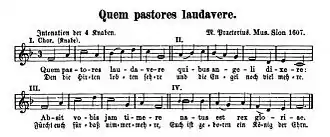Quempas
"Quempas" is the shortened title of the Latin Christmas carol "Quem pastores laudavere" ("He whom the shepherds praised"), popular in Germany in the sixteenth century, and used as a generic term for Christmas songs in a German caroling tradition.[1] Quempas is the name of an early tradition of singing carols, and the name of a collection of old carols by Bärenreiter, first published in 1930.
| "Quempas" | |
|---|---|
| Christmas carol | |
 | |
| English | "He whom the shepherds praised" |
| Full title | "Quem pastores laudavere" |
| Genre | Christmas carol |
| Language | Latin |
History
The earliest sources of the carol are from the fifteenth century, including the Hohenfurth Monastery Ms. 28 (1410). Many versions exist from the sixteenth century. The most famous version is from Michael Praetorius, Musae Sioniae (1607), with the German text "Den die Hirten lobeten sehre."[2]
Students of the Latin school maintained a tradition of "Quempas singen," earning alms by going from house to house, singing carols.[1]
In order to revive the Quempas singing tradition and fight the sentimentality of 19th-century Christmas carols, Wilhelm Thomas and Konrad Ameln published a collection of old carols under the title Quempas, sometimes called Quempas-Heft, printed by Bärenreiter.[3][4] The first collection contained 39 songs with melodies. It was followed by choral editions, and a greater selection including 20th-century carols in 1962.[3] Der neue Quempas, a collection of 41 songs, was published in 2012.[3]
References
- Root, Deane L., ed. (2001). "Quempas". The New Grove Dictionary of Music and Musicians. Oxford University Press.
- Evangelisches Gesangbuch (EG), Hessen edition, Frankfurt 1994. EG 29.
- "Quempas" (in German). Bärenreiter. Retrieved 25 December 2018.
- Heinz Grosch, Johannes Thomas: THOMAS, Wilhelm. In: Biographisch-Bibliographisches Kirchenlexikon (BBKL). Vol. 29, Bautz, Nordhausen 2008, ISBN 978-3-88309-452-6, Sp. 1425–1433.